Related Research Articles

Cairo is the capital of Egypt and the city-state Cairo Governorate, and is the country's largest city, home to 10 million people. It is also part of the largest urban agglomeration in Africa, the Arab world and the Middle East: The Greater Cairo metropolitan area, with a population of 21.9 million, is the 12th-largest in the world by population. Cairo is associated with ancient Egypt, as the Giza pyramid complex and the ancient cities of Memphis and Heliopolis are located in its geographical area. Located near the Nile Delta, the city first developed as Fustat, a settlement founded after the Muslim conquest of Egypt in 640 next to an existing ancient Roman fortress, Babylon. Under the Fatimid dynasty a new city, al-Qāhirah, was founded nearby in 969. It later superseded Fustat as the main urban centre during the Ayyubid and Mamluk periods. Cairo has long been a centre of the region's political and cultural life, and is titled "the city of a thousand minarets" for its preponderance of Islamic architecture. Cairo's historic center was awarded World Heritage Site status in 1979. Cairo is considered a World City with a "Beta +" classification according to GaWC.

Gamal Abdel Nasser Hussein was an Egyptian politician who served as the second president of Egypt from 1954 until his death in 1970. Nasser led the Egyptian revolution of 1952 and introduced far-reaching land reforms the following year. Following a 1954 attempt on his life by a Muslim Brotherhood member, he cracked down on the organization, put President Mohamed Naguib under house arrest and assumed executive office. He was formally elected president in June 1956.

In Islam, the ulama are the guardians, transmitters, and interpreters of religious knowledge in Islam, including Islamic doctrine and law.

The Al-Azhar University is a public university in Cairo, Egypt. Associated with Al-Azhar Al-Sharif in Islamic Cairo, it is Egypt's oldest degree-granting university and is renowned as the most prestigious university for Islamic learning. In addition to higher education, Al-Azhar oversees a national network of schools with approximately two million students. As of 1996, over 4,000 teaching institutes in Egypt were affiliated with the university.
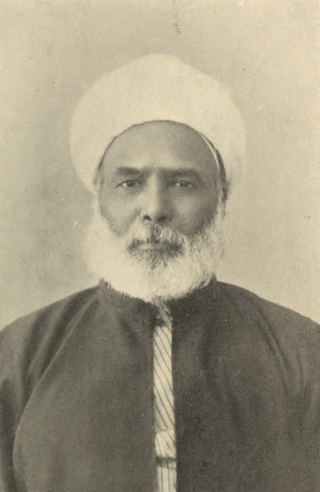
Muḥammad ʿAbduh was an Egyptian Islamic scholar, journalist, teacher, author, editor, judge, and Grand Mufti of Egypt. He was a central figure of the Arab Nahḍa and Islamic Modernism in the late 19th and early 20th centuries.
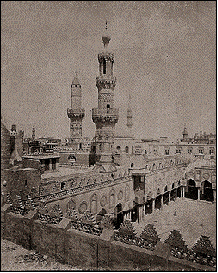
Islam is the dominant religion in Egypt, with approximately 90.3% of Egyptians identifying as Muslims. The majority of Egyptian Muslims are adherents of Sunni Islam, while a small minority adhere to Shia Islam. Since 1980, Islam has served as Egypt's state religion. Due to the lack of a religious census, owing to the alleged undercounting of non-Muslim minorities in Egyptian censuses, the actual percentage of Muslims is unknown; the percentage of Egyptian Christians, who are the second-largest religious group in the country, is estimated to be between 5% and 15% of the population.

Taha Hussein was one of the most influential 20th-century Egyptian writers and intellectuals, and a figurehead for the Egyptian Renaissance and the modernist movement in the Middle East and North Africa. His sobriquet was "The Dean of Arabic Literature" . He was nominated for the Nobel Prize in Literature twenty-one times.

Al-Ahbash, also known as the Association of Islamic Charitable Projects is a neo-traditionalist Sufi religious movement which was founded in the mid-1980s. The group follow the teachings of Ethiopian scholar Abdullah al-Harari. Due to the group's origins and activity in Lebanon, the Ahbash have been described as the "activist expression of Lebanese Sufism."

Ali Gomaa is an Egyptian Islamic scholar, Jurist, and public figure who has taken a number of controversial political stances. He specializes in Islamic Legal Theory. He follows the Shafi`i school of Islamic jurisprudence and the Ash'ari school of tenets of faith. Gomaa is a Sufi. Gomaa is also a supporter of the 2013 Military Coup.
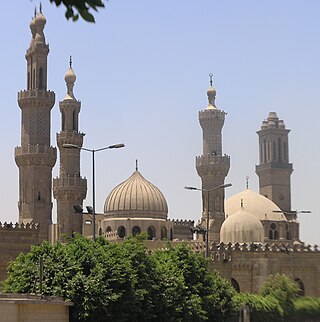
Al-Azhar Mosque, known in Egypt simply as al-Azhar, is a mosque in Cairo, Egypt in the historic Islamic core of the city. Commissioned by Jawhar al-Siqilli shortly after Cairo was established as the new capital of the Fatimid Caliphate in 970, it was the first mosque established in a city that eventually earned the nickname "the City of a Thousand Minarets". Its name is usually thought to derive from az-Zahrāʾ, a title given to Fatimah, the daughter of Muhammad.

Ahmed Mohamed Ahmed El-Tayeb is an Egyptian Islamic scholar and the current Grand Imam of al-Azhar, Al-Azhar Al Sharif and former president of al-Azhar University. He was appointed by the Egyptian President, Hosni Mubarak, following the death of Mohamed Sayed Tantawy in 2010. He is from Kurna, Luxor Governorate in Upper Egypt, and he belongs to a Sunni Muslim family.

People's Republic of China – Egypt relations were established on May 30, 1956.
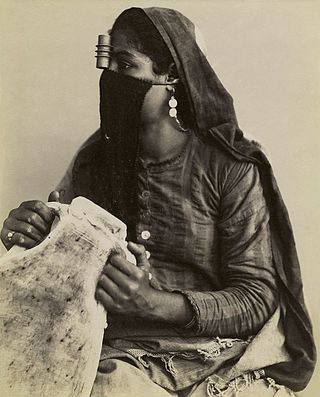
In a predominantly Muslim society, as many as 90% of women in Egypt have adopted a form of veiling. A majority of Egyptian women cover at least their hair with the hijab. A hijab refers to a head covering that is worn by Muslim women. Although the phenomenon of wearing the niqāb, a veil which covers the face is not as common, the niqab in Egypt has become more prevalent. While a few women in Egypt wear a black niqab along with a billowing black abaya as seen in countries such as Saudi Arabia, many choose to wear different colors of the niqab or manipulate the hijab to cover their face. Regardless, the growing trend of munaqqabat, or women who wear the niqab, has alarmed the authorities. They have begun to see this dress as a security threat, because it hides the face, and because it is perceived as a political statement, a rejection of the state in favor of a strict Islamic system.
The Grand Imam of al-Azhar, also known as Grand Sheikh of al-Azhar, currently Ahmed el-Tayeb, is a prestigious and a prominent official title in Egypt. He is considered by some Muslims to be the highest authority in Sunni Islamic thought and Islamic jurisprudence and holds great influence on followers of the theological Ash'ari and Maturidi traditions worldwide. The Grand Imam heads the Al-Azhar Al Sharif, al-Azhar Mosque, and by extension al-Azhar University, and is responsible for official religious matters along with the Grand Mufti of Egypt.
The following is a timeline of the history of the city of Cairo, Egypt.
Mustafa al-Siba'i was a Syrian politician and activist. He was dean of the Faculty of Islamic Jurisprudence and the School of Law at the University of Damascus. From 1945 to 1961 he was the leader of the Muslim Brotherhood in Syria, the Syrian branch of the Muslim Brotherhood.
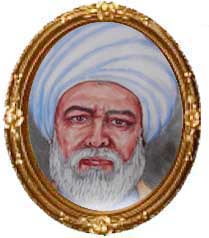
Ibrāhīm ibn Muhammad ibn Ahmad al-Bājūrī was an Egyptian-Ottoman scholar, theologian and a dean of the al-Azhar University. A follower of Imam Al-Shafiʽi, he authored over 20 works and commentaries in sacred law, tenets of faith, Islamic estate division, scholastic theology, logic and Arabic.

The Ahmadiyya is an Islamic movement in Egypt with origins in the Indian subcontinent. Although the earliest contact between Egyptians and the Ahmadiyya movement was during the lifetime of Mirza Ghulam Ahmad, its founder, the movement in Egypt was formally established in 1922 under the leadership of its second Caliph Opposition to the Ahmadiyya grew particularly in the latter part the 20th century and Ahmadis have seen increased hostility in Egypt more recently. There are up to 50,000 Ahmadi Muslims in Egypt. Although the group is not officially recognised by the state.
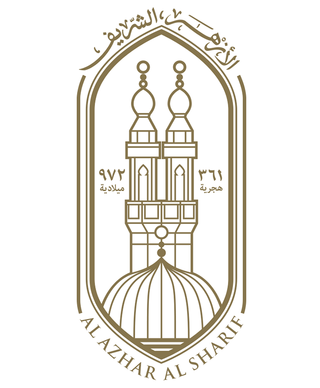
Al-Azhar Al-Sharif is an Islamic scientific body and the largest religious institution in Egypt. Its headquarters is located in the building of the Sheikhdom of Al-Azhar in the center of the Egyptian capital, Cairo. The history of the establishment of the Al-Azhar Mosque dates back to the year 972 by the Fatimid Caliph Al-Muizz Li-Din Allah. It is considered the third oldest university in the world after Al-Zaytoonah and Al-Qarawiyyin universities.
References
- General
- رؤساء جامعة الأزهر منذ صدور القانون رقم 103 لسنة 1961 [Presidents of Al-Azhar University since the promulgation of Act 103 of 1961] (in Arabic). Official website of Al-Azhar University. Archived from the original on 2011-05-08. Retrieved 2011-03-29.
- Specific
- ↑ Qubain, Fahim Issa (1979). Education and Science in the Arab World. Johns Hopkins University Press Reprints (Reprinted ed.). New York: Arno Press. p. 62. ISBN 978-0-405-10622-4.
- ↑ Skovgaard-Petersen, Jakob (1997). Defining Islam for the Egyptian State: Muftis and Fatwas of the Dār al-Iftā. Volume 59 of Social, economic, and political studies of the Middle East and Asia. Leiden: Brill. p. 186. ISBN 978-90-04-10947-6.